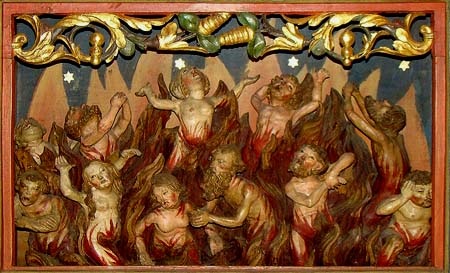She went to a wealthy gentleman, and, relating to him the sad story of her woes, entreated him with tears to assist her. God permitted that she should receive but one trifling alms, a carlin, a piece of money worth about 10 cents of our coin.
Deeply afflicted, she entered a church to implore the God of the indigent to succor her in her distress, since she had nothing to hope from earth. She was absorbed in her prayers and tears, when, by an inspiration, no doubt, of her Guardian Angel, it occurred to her to interest the sympathy of the Holy Souls in her behalf, for she had heard much of their sufferings, and of their gratitude towards those who befriend them. Full of confidence, she went into the sacristy, offered her little piece of money, and asked if a Mass could be celebrated for the dead. The good priest, who was there, hastened to say Mass for her intention, and ascended the altar for that purpose, whilst the poor woman, keeling on the pavement, assisted at the Holy Sacrifice, offering her prayers for the departed.
She returned quite consoled, as though she had received the assurance that God had heard her prayer. Whilst traversing the populous streets of Naples, she was accosted by a venerable old man, who inquired whence she came and whither she was going? The unfortunate woman explained her distress, and the use she had made of the small alms she had received. The old man seemed deeply touched by her misery, spoke some words of encouragement, and gave her a note enclosed in an envelope, which he directed her to take to a gentleman whom he designated, and then left her.
The woman went to deliver the note to the gentleman indicated. The latter, on opening the envelope, was seized with astonishment, and was on the point of fainting away. He recognized the handwriting of his father, who had died some time previous. "Where did you get this letter?" he asked, quite beside himself. "Sir," replied the good woman, "it was from an old man who accosted me in the street. I told him of my distress, and he sent me to give you this note in his name. As regards his features, he very much resembles that portrait you have there over the door."
More and more impressed by these circumstances, the gentleman again took up the note, and read aloud: "My son, your father has just been delivered from Purgatory, thanks to a Mass which the bearer has had celebrated this morning. She is in great distress, and I recommend her to you." He read and re-read those lines, traced by that hand so dear to him, by a father who was now among the number of the elect. Tears of joy coursed down his cheeks as he turned towards the woman. "Poor woman," he said, "by your alms you have secured the eternal felicity of him who gave me life. In my turn I will secure your temporal happiness. I take upon myself to supply all the needs of yourself and your whole family."
What joy for that gentleman! What joy for that poor woman! It is difficult to say on which side was the greatest happiness. What is most important and most easy is, to see the instruction to be derived from this incident; it teaches us that the smallest act of charity towards the members of the Church Suffering is precious in the sight of God, and draws down upon us miracles of mercy.
From F.X. Schouppe, The Lives & Legends of Saints, chap 48
Posted October 28, 2011


 RSS Feed
RSS Feed
